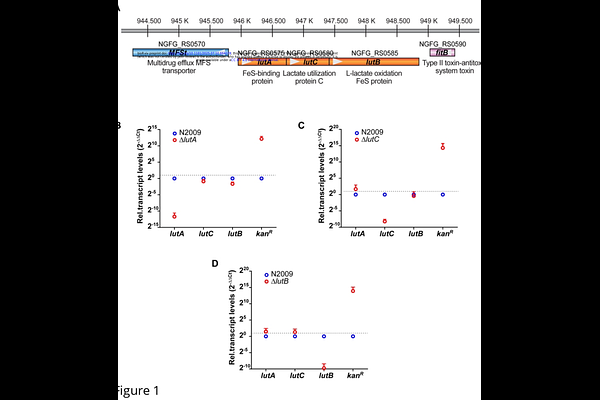Metabolic role of the LutACB operon in Neisseria gonorrhoeae resistance to neutrophil-mediated clearance

Metabolic role of the LutACB operon in Neisseria gonorrhoeae resistance to neutrophil-mediated clearance
Rawal, R.; Schmidt, J.; Schmitz, W.; Heydarian, M.; Klepsch, M.; Rudel, T.; Kozjak-Pavlovic, V.
AbstractNeisseria gonorrhoeae, an obligate human pathogen, causes the sexually transmitted disease gonorrhoea and primarily colonizes the human genitourinary tract. An infection triggers a strong neutrophil-driven inflammatory response; however, viable gonococci are frequently recovered from neutrophil-rich patient exudates, indicating that these pathogens can survive neutrophil-mediated killing in vivo. To identify bacterial factors involved in this interaction, we screened a N. gonorrhoeae transposon library for mutants with reduced survival in polymorphonuclear leukocytes (PMNs). Among the identified candidates was NGFG_RS05085 (lutB), encoding an L-lactate oxidation FeS protein within the LutACB operon, which includes lutA (NGFG_RS05075), an FeS-binding protein, and lutC, the lactate utilisation protein C, (NGFG_RS05080). Deletion of lutA, lutB, or lutC did not significantly impair growth in standard culture medium or in minimal medium complemented with glucose, L-Lactate, or pyruvate. lutB and lutC, but not lutA, knockout significantly reduced bacterial survival within neutrophils compared to the wild-type strain. Polar effects of the mutations were ruled out by monitoring gene expression in deletion mutants. Metabolic profiling revealed disruption in nucleotide and glutathione synthesis, connecting the LutACB operon with sulfur metabolism, which could be required for a defence against neutrophil-derived reactive oxygen species (ROS). These findings highlight the important novel role of the LutACB operon, which connects lactate utilization and sulfur metabolism, and enables N. gonorrhoeae to withstand neutrophil-mediated oxidative stress during infection.